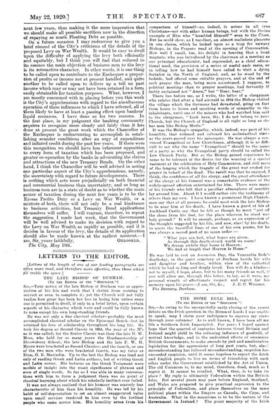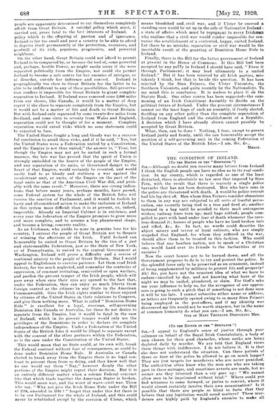THE HOME RULE BILL.
[To rat Enrron or inn gg SPECrATOR."] Sta,—As owing to the unexpectedly early closing of the recent debate on the Irish question in the House of Lords I was unable to speak, may I claim your indulgence to express my views through your columns? As is well known, I have been all my life a Southern Irish Imperialist. For years I hoped against hope that the quarrel of centuries between Great Britain and Ireland might yield to the softening influence of goodwill, of mutual knowledge, and to the undoubted efforts of successive British Governments, to make amends by just and ameliorative legislation for the oppressions of long past years, but, alas! misunderstanding has followed misunderstanding, suspicion has succeeded suspicion, until it seems hopeless to expect the Irish and English people to live on terms of friendship with each other under the Government established by the Act of Union. The old Unionism is, to my mind, therefore, dead, much as I regret it. It cannot be recalled. What, then, is to take its place ? My reply is ultimately Federalism within the British Isles. But several years may pass before England, Scotland, and Wales are prepared to give practical expression to the principle of Federalism, and place themselves on the same political plane within the Empire as Canada, the Cape,- and Australia. What in the meantime is to be the nature of the Government in Ireland ? The great majority of the Irish
people are apparently determined to cut themselves completely adrift from Great Britain. A suicidal .policy. which must, if carried out, prove fatal to the best interests of Ireland. A policy which is the offspring of passion and of ignorance. Ireland is far too small and poor a country to be able to afford to deprive itself permanently of the protection, resources, and goodwill of its rich, populous, progressive, and powerful neighbour.
On the other hand, Great Britain could not afford to permit Ireland to be conquered by, or become the tool of, some powerful and, perhaps, hostile Power, as might easily occur if she were separated politically from the Empire, nor could she permit Ireland to become a safe centre for her enemies of intrigue, or of disorder, outside her influence and control. Ireland is geographically too close to Great Britain for the latter to be able to be indifferent to any of these possibilities. Self-preserva- tion renders it impossible for Great Britain to grant complete separation to Ireland. If Ireland were removed some 3,000 miles from our shores, like Canada, it would be a matter of deep regret if she chose to separate completely from the Empire, but it would not be a matter of life and death 4o Great Britain. But with Ireland only separated by some twenty-five miles from Scotland, and some sixty to seventy from Wales and England, separation could not be thought of for a moment. Complete separation would entail risks which no sane statesmen could be expected to face.
The United States fought a long and bloody war to a success- ful conclusion to avoid these risks, and if it be said, " Yes, but the United States were a Federation united by a Constitution, and the Empire is not thus united," the answer is, " True, but though the Empire may not yet be united in such a formal manner, the late war has proved that the spirit of Union is strongly embedded in the hearts of the people of the- Empire, and any separation of its units, or threatened danger to the heart of that Empire, would certainly be resented, and would easily lead to as bloody and stubborn a war against the recalcitrant unit, or units, of the Empire on the part of the loyal units as that-of the American Civil War did, and prob- ably with the same result." Moreover, there are strong indica- tions that before many years, perhaps months, have passed, some Federal system for the whole of the British Isles will receive the sanction of Parliament, and it would be foolish by hasty and ill-considered action to make the inclusion of Ireland in this system more difficult than it is at present, or, indeed, impossible. Already an Imperial Cabinet is in existence, and every year the federation of the Empire promises to grow more and more complete, and to assume a less phantasmal shape,
and become a living, concrete reality. '
As an Irishman, who yields to none in genuine love for his country, I entreat the people of Great Britain not to despair of winning the affections of the Irish. Until Ireland can honourably be united to Great Britain by the ties of a just and statesmanlike Federation, just as the State of New York, or of Pennsylvania, is united to the central Government at Washington, Ireland will prove a difficulty and a source of continual anxiety to the people of Great Britain. But I would appeal to Englishmen to exercise patience. Let them read Irish history, far too much neglected, and remember the centuries of oppression, of constant irritating, semi-veiled or open warfare, and pardon the present temper of the Irish people, which will pass away when once their eyes are opened to the fact that, under the Federation,' they can enjoy as much liberty from foreign control as the citizens 'in any State in the American Commonwealth. Give the Irish rights similar to those enjoyed by citizens of the United States in their relations to Congress, and give them nothing more. What is called " Dominion Home Rule" is excellent for a loyal, overseas, self-governing Dominion like Canada or Australia, for these do not desire to separate from the Empire, but it would be fatal in the case of Ireland, which in its present temper would only use the privileges of the Dominions in order to declare its complete independence of the Empire. Under a Federation of the United States of the British Isles it would be illegal to separate except with the consent of the other partners within the Federation, as is the case under the Constitution of the United States.
This would mean that no State could, at its own will, break the Federal contract without fear of consequences, as could be done under Dominion Home Rule. If Australia or Canada elected to break away from the Empire there is no legal con- tract to prevent them from so doing, and they know well that no one would say them " Nay," however deeply the other portions of the Empire might regret their decision. But it is an entirely different matter when a solemn Federal contract like that which hinds together the American States is broken.
This would mean war, and the worst of wars—civil war. Those who say, " Why not give the Irish Home Rule under the Bill of 1914, amended in 1916 ? " forget that under tliis Act there is to be one Parliament for the whole of Ireland, and this could never be established except by the coercion of Ulster, which means bloodshed and. civil war, and if Ulster be coerced a standing sore would be set up in the side of Nationalist Ireland: a state of affairs which must be repugnant to every Irishman who realizes that a civil war would render impossible for cen- turies the establishment of a contented, happy, united Ireland. Let there be no mistake, separation or civil war would be the inevitable result of the granting of Dominion Home Rule to Ireland.
Finally, there is the Bill for the better government of Ireland at present in the House of Commons. If this Bill had been accepted by any play in Ireland I should have said, "Press it through Parliament; it may lead ultimately to a united Ireland." But it has been rejected by all Irish parties, mis- takenly I think, but that is beside the question. It has been rejected by the Sinn Feiners, the Ulster Unionists, the Southern Unionists, and quite recently by the Nationalists. To my mind this is conclusive. It is useless to place it on the Statute Book. One other course has been suggested—the sum- moning of an Irish Constituent Assembly to decide on the political- future of Ireland. Under the present circumstances I cannot see the least hope of such an assembly, if freely elected, deciding on any other policy than the complete separation of Ireland from England and the establishment of a Republic. A decision which I have already shown cannot possibly be accepted by Great Britain.
What, then, can he done ? Nothing, I fear, except to govern Ireland justly and firmly, until she can honourably accept the position of a self-governing unit in the coming Federation of the United States of the British Isles.—I am, Sir, &c.,
MEATH.



































 Previous page
Previous page